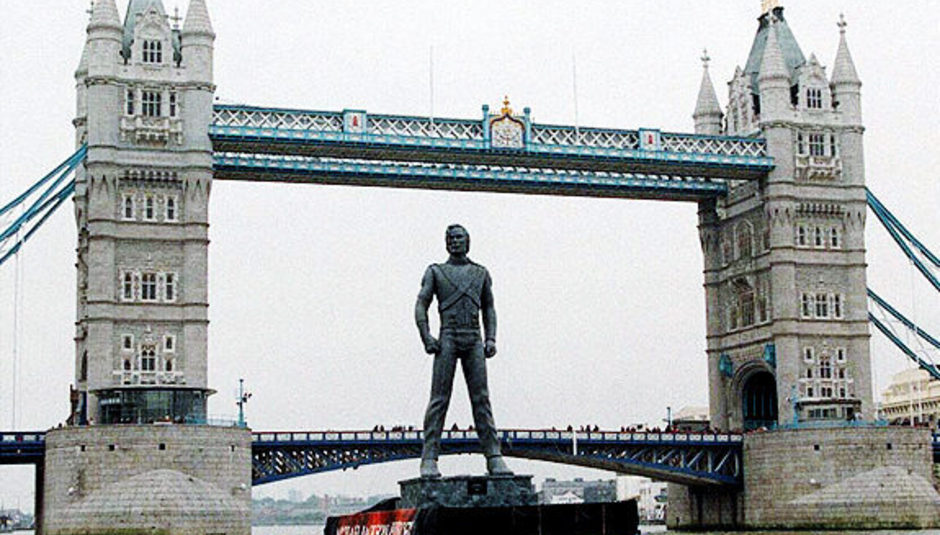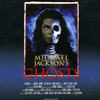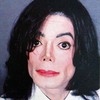See yesterday's column for the why of what we're doing here, hear below a We7 playlist snappily entitled A Playable Thirteen-Track, One Hour-Plus Playlist In Search Of What Was Left 1991-2001 Through Songs At Least Co-Written By The Man In Question (Except One By R. Kelly But Oh Well) And Mostly Not The Hits, Either.
01. 'Jam' (from Dangerous)
Dangerous was released at the end of 1991, a year before the Chandler allegations made the media, but managed to become Jackson's second-best selling album despite the attendant sales drag (it had been anticipated enough for armed robbers to steal an airport shipment...) The record's engineered eclecticism reflected an industry-wide turn toward (CD-optimised) longer collections – more 'multi-faceted' (ew) spectacular than thematic suite.
'Jam' kicks in through the heavy symbolism / special FX of breaking glass, and its madeover urbanism is mannered enough to recall a current affairs inner city segment. Somewhere over the graffito, Slash's preeniest 'licks' (um) gel fairly faultlessly with the New Jack Swing scaffolding brought in by Teddy Riley, and Jackson's gift for unlikely fusion plus widescreen projection scale sharp details for stadia (though it's worth noting that his sister Janet had already had huge success with a similar sound on the remorselessly wonderful Control) and Rhythm Nation albums).
02. 'In The Closet' (from Dangerous)
Originally, the uncredited 'mystery girl' who wheezily recites perfume ad pseudo-transgressions (“The truth of lust”, “Touch me there...cast the spell” ooo etc) was to be Madonna, but her words were allegedly too actually rude. Instead, in a kind of weird coup, Princess Stephanie of Monaco ended up in the role, suggestive but never beyond the point of plausible deniability, loaded with blanks (additionally, the New York Times hit a cultured zinger when a correspondent noted only Jackson would use such a title for a heterosexual duet...).
More importantly, 'In The Closet's synthetic intimacy oozes along on a phenomenal rhythm track – clinks and tuts like stoneware engaging in outercourse, in a laboratory. Like much of the earlier Nineties' rash of middlebrow erotica, it's aching hard to be considered art for adults, and the video reinforces that thrust with sepia badlands cinematography, though minor royal is eschewed for supermodel (one of the many projects cancelled due to the Chandler allegations was apparently a his'n'hers scent).
03. 'Give In To Me' (from Dangerous)
Michael Jackson - Give In To Me (Official Music Video) - Watch more amazing videos here
One of the album's two calculatedly unlikely and doubtless fully-insured 'special guest performances' by Slash is inescapably a rock ballad, complete with wilty solo and well-conditioned hair. Somehow, it is still good (shut up, it is). The video semi-cleverly casts Jackson as, like, just the singer in some band who remotely trash their equipment via psychic power of pro rock, rowr, etc. Plenty loud, still pretty.
What I find compulsive about this particular love song, though, is our frontman's dominant tone, as opposed to passive/possessed plaything (the latter being annoyingly standard in mass market love songs, and a common disclaimer sheathing fantasies besides...) Sometimes the lyrics are even fairly disturbing, considering: “Don't try to understand me / Just simply do the / Thing I say...” It reads more like psychological warfare than passion – which is probably why I like it, but almost certainly not what was intended. “Give in to me,” he snarls as Slash drags his, ahem, 'axe' (anyone ever said that in real life?) through the gutter. “Give in to me / Give in to me...” and so on, you know.
04. 'They Don't Care About Us' (from HIStory)
The initial round of investigations ended in 1994, and some genius (or, more likely, glass table of genii – I'm pretty sure that's the plural) decided the bruised quiet after the storm was the perfect time to prod a greatest hits / new songs compilation toward an uncertain public via the most alienatingly hubristic campaign of propagandistic statues imaginable. Likewise, nobody on the inside seemed to notice that there was something inescapably bathetic about floating statues...
Things could have gone badly wrong here, especially when 'They Don't Care About Us' – otherwise probably the strongest song on the album (read as: my favourite) – was accused of anti-semitism (the lyrics were overdubbed at his own cost, and this version became his biggest hit in Germany). He also worked with Spike Lee on two videos, one terrifyingly inflammatory if-slightly-camp version shunned by the media for visualising solidarity with prisoners, and a friendlier, more celebratory trip to a Brazilian shanty-town that was immediately accused of exploitation (though that would later be contested – and here's Spike Lee's opinion.
05. 'Stranger In Moscow' (from HIStory)
From Rio to Russia – in interviews, Michael would claim to wander streets alone at night (“Here abandoned in my fame”), and 'Stranger in Moscow' does nail a sense of not belonging to your surroundings. Best, it's kept simple: ebbing verses, the three-time tease when he leaves “How does it feel?” unanswered before the chorus arrives – itself only really a muted extension. Stubby beats, a strumming waterclock guitar motif – the problem with his most abject songs is that however milky they are from the off, he often can't resist dumping in a load of sugar besides. Not here.
06. 'This Time Around' (from HIStory)
Synchronising with the mid-Nineties R&B via collabos like this with Dallas Austin proved a way out of the baroque cul-de-sac of the 'single as video as event' mindset which had ruled top-down MTV but risked presenting easier targets to growing doubters. New producers would help prune his obsession with over-elaboration in favour of more understated elegance, while crucially maintaining momentum. Texture-rich minimalism also gave more latitude to showboat in less hysterical ways. 'This Time Around' would also feature his first Notorious B.I.G. guest rap (the second would be posthumous).
07. '2 Bad' (from HIStory)
Not so much to say about this one. It's kind of a continuation-as-accretion of the big city rhythm tics plus rock peacockery he used for his streetsier singles – a well-choreographed riot in the suburbs, if you like. Also: the longer it lasts, the more the arrangement congests toward maximum caffeination, a hyper-articulated ensemble piece for fight game percussion. It even cannibalises a sample from his own 'Beat It' (aside: the video for which featured – they say – more real gang members, primped by stylists, than dancers).
08. 'Ghost' (from Blood On The Dancefloor)
Something else that got cancelled due to the Chandler allegations was Jackson's Pepsi contract, just on the eve of a project which would have revisited the schlock horror imagery of 'Thriller'. Returning to the idea independently, he would premier Ghosts (co-written with Stephen King) at Cannes in 1996.
The film is stymied by the ostentation of its victim complex – synopsis: archetypal outraged smalltown locals confront eccentric stranger (guess who) in mansion. Really more child-friendly comedy than horror, the most disturbing element remains Jackson's own portrayal of thinly-disguised, very demonised legal adversary Tom Sneddon (also winning a song to himself in 'D.S.'). “Are you the ghost of jealousy?”
Meanwhile, as a song: excellent noises, including a loop that sounds a bit like coins rolling through a metal pipe, or a vibrating phone on a steel drum – the kind of thing American critics insist on calling 'digital funk' in a bid to make me shit a broken rib.
It's perhaps reading too deeply, but I've spent quality time musing how his fascination had switched from 'Thriller's werewolf – civilised man struggling with own animal nature – to ghost (albeit one with spectacular powers). It's as if he suspected even then he'd outlived himself.
09. 'Is It Scary' (From Blood On The Dancefloor)
This playlist is intended as an indirect guide to where Michael was more or less at in that long lost decade-and-a-half, but there are a few peaks I would – CONTROVERSIALLY – say measure up against his best – and this is one of them. Syncopated gasps, operatic splendour, all-or-nothing dynamics...
The tweenage-idea-of-spooky lyrics are embarrassing, though – UNTIL: “Am I amusing you / Or just confusing you? / Am I the beast / You visualised? / If you want to see / Eccentricities / I'll be grotesque / Before your eyes.” FOLLOWED by: “Can the heart reveal the proof / Like a mirror reveals the truth? / See the evil one is you...” And THEN: “Am I scary for you?” BOLD this: “You know you're scaring me too” And, for extra EMPHASIS: “I see the evil is you.” It's like the acquittal speech in a murder musical, pure crescendo.
10. 'Heartbreaker' (from Invincible)
It feels weird to write about 2001's Invincible as The Final Album since it seemed both muted and transitional (let's not talk about Thriller 25's botched resurrections). Hindsight also shows that – diminished as he was by the wake of the Chandler allegations, he was closing fast on a second round that would hit twice as hard (2003). The dogmatic defiance of the persona embodied across the disc would be even more fragile than he realised, and when he sings “You can't touch me, 'cause I'm untouchable” it sounds more like caste sadness than an injunction. If his career had bounced, say, half of the way back, it was increasingly noticeable that the fans he had lost were those at home, and it was only the global trickledown outside traditional markets holding him in place.
'Heartbreaker' offers Rodney Jerkins the chance to marry the staggering syncopations of his and Brandy's 'What About Us' to the bass croak of Timbaland/Ginuwine's 'Pony'. If it may not go beyond the parameters of its classic templates, that's nothing new – Michael's talent for singing, dancing and writing was ultimately underwritten by an even stronger instinct for popularisation.
11. '2000 Watts' (from Invincible)
One of the good things about Invincible having its video budget unceremoniously cut (just after Sony were informed he'd soon be leaving, funnily enough) is that the album's songs escape the 'visionary' multi-media treatment that had so long been his default. Maybe music that would remain just music, rather than multi-tasking as soundtrack or dance routine could have provided a chance to reconnect with whatever of him hadn't long since been mined clean by the spotlight. '2000 Watts' is certainly atypical, with his lyrics delivered in an unusually low register over chrome-plated drivetime beats, boding well for the future, except...
12. 'Morphine' (from Blood on the Dancefloor)
Nothing illustrates the relative obscurity of Jackson's last works like the fact that, as the media added up the emerging drug addictions, no one (that I saw) thought to illustrate an article with this song from his penultimate album which – in the reviews at the time – was compared not unreasonably to Nine Inch Nails (at least one invoking 'industrial groove' in an attempt to make my kidneys implode). The comparison actually stands up courtesy of the ultra-compressed bands of just-about melody that sear the verses. However, the moment at 3:37, when all that falls away and we're left with the brittle piano notes of a Disney death bed fantasia is all his own. “Demerol / Demerol / Oh God he's taking Demerol” he sings, see-sawing between act-out anger and abject cry for help. This song is from 1997. Suddenly, everything which followed seems wholly avoidable.
13. 'Cry' (from Invincible)
The penultimate single, the last video (in which he didn't appear), the only song on the list he didn't write. It's full-on anodyne business from R. Kelly, an uphill beat, pretty clusters of muted notes, a gospel choir emoting in a vacuum. But there's a startling line amidst the platitudes – and, even if he didn't write it, he approved it, he sings it like he means it.
Choir: “You can change the world”
Michael: “I can't do it by myself”
Choir: “You can touch the sky"
Michael: “Gonna take somebody's help”
Choir: “You're the chosen one...” (Hmm)
Michael: “I'm gonna need some kind of sign”
And here it is, after all this, their voices combining, the music abruptly highwater bouyant, a steady, heavy march from somewhere, new energy in the masses finally opening up. So, what are they singing? What is the answer they arrive at together?
All: “If we all cry at the same time tonight...”
As an ultimate expression of passive-aggressiveness, as a spectacular dead end, as a pretty good summation of how broken he'd been and damaged he'd remained despite the posturing – now at the end, unable to think beyond the simple solidarity of despair. Whatever the facts of the story – if we ever know, and we probably won't – it's the sadness, in the end, that stays.
Tomorrow: What Happens Next In A World Without A King (Of Pop)? Forthcoming Releases, Posthumous Remixes And Home Demos, Further Confusion Plus Conclusion Failure






















